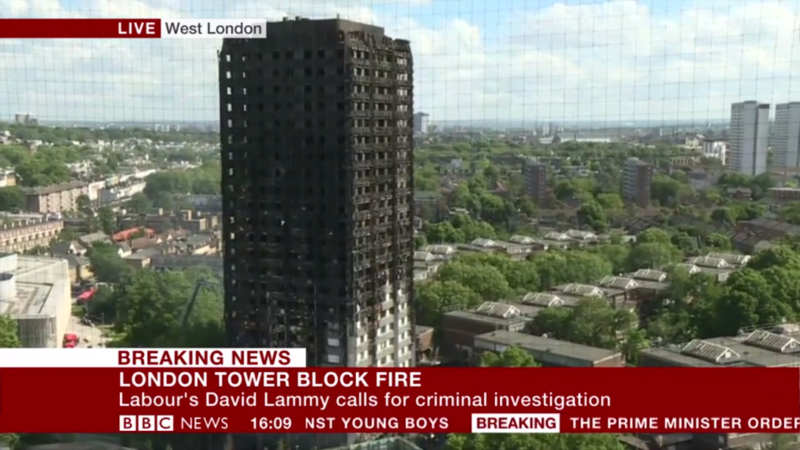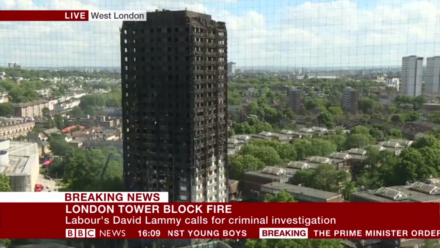

Last night, in a truly extraordinary meeting, Kensington and Chelsea council committed itself to calling on the government for a full and permanent immigration amnesty for survivors of the Grenfell Tower fire. It’s a decision that puts the council’s new Conservative leadership at odds with its own national party policy. This was one of four Labour group motions which were unanimously passed without debate, after normal standing orders were suspended so that survivors of the fire could come and address councillors.
We brought our immigration motion to council for Grenfell Tower survivors like Rhea. Rhea was an undocumented migrant from the Philippines and lived with her friend Helen on the 21st floor. Rhea agreed to be interviewed for the BBC Asian Network by Rickin Majithia but only if her face was not shown.
In the interview Rhea explained that because she was not registered in the tower she could not initially be recognised as one of the victims and was therefore unable to access the provisions in place for survivors. In the light of immigration minister Brandon Lewis’ introduction of a time-limited 12 month amnesty Rhea has since come forward and is now in receipt of some official support. But Rhea is still immensely worried about what happens to her in a year’s time. Will a visa be reissued or will she be deported?
In her interview you can see that the tragedy of Grenfell Tower is one that has been a personal ordeal. Rhea has been very deeply affected by what she experienced that night. She is very clearly showing the signs of post-traumatic stress. Yet, even in the midst of such abject personal suffering, Rhea displayed concern and empathy for others. She wondered how many people were in that tower that night who were in exactly the same situation as her. She is personally aware of other undocumented people who lived in Grenfell: homeless sofa surfers, squatters, or those in illegal sublets. She is aware of some people who were even sleeping on the stairs.
In the light of the immigration amnesty Rhea came forward. But, as far as I am aware she is the only one, and her story illustrates why a full amnesty for undocumented survivors is now necessary.
Staff at the North Kensington law centre know of another five undocumented people who have applied for the 12 month leave-to-remain visa. But all five would have felt safe to come forwards since two of them are in relationships with UK nationals and three of them already had outstanding applications from the home office. What has not been seen are single, undocumented, individual survivors who were previously unknown to the authorities. Migrants Organised, who are working with Rhea, are aware of two people who fall within this category and estimate that there could be another two or three. Meanwhile Doctors of the World, who have been working with undocumented survivors, have noted a drop in the take up of their services since the announcement.
Given the time that has now elapsed since the fire, these people will find it very difficult to come forward. But encouraging such people to come forward was the government’s stated aim in introducing the 12 month policy. The policy then is clearly not working as intended. So, in the first place, it is only a full and permanent amnesty that will serve the purpose of enabling survivors to access the services and support available.
Secondly, such an amnesty is required in order to satisfy the prime minister’s intention that “no stone will be left unturned” by the police investigation and the public inquiry. These are likely to last longer than a year. But, if undocumented residents of the tower feel unable to come forward because of fears of future deportation, then important witness evidence will be lost.
Thirdly, we in the Labour group believe that a full amnesty is simply the compassionate response to a unique tragedy. Rhea’s worry about deportation indicates the heaping of stress upon stress, trauma upon trauma, coals upon an already searing fire of personal suffering. Undocumented survivors, like all other survivors, have experienced the worst tragedy of their lives – in our borough, and in our council’s property. It is incumbent upon us as human beings to give them the time and resources to heal from a tragedy for which those in power on the council have responsibility.
I am pleased that our Conservative-controlled administration felt able to support the motion I tabled last night. I hope that the national Tory government will respond by making the changes that are desperately needed in order to address the almost total breakdown of trust in the authorities in our very fractured communities in North Kensington.
Many of our residents feel there is a Grenfell cover up. Granting a full and permanent immigration amnesty to survivors is the very least that Theresa May and the home office can do so that others in Rhea’s situation are not covered up. The government now needs to follow the lead of our council and show the compassion for others that Rhea herself displays. It is essential so that they can be given the help they need and be interviewed for any investigation or inquiry – while showing their faces.



More from LabourList
Exclusive: Poll shows Starmer more trusted than PM on Middle East crisis
Revealed: Poll shows 1 in 4 Tory voters says Rayner faces ‘smear campaign’
‘Ignore the noise – the soft left is alive and well in Open Labour and beyond’